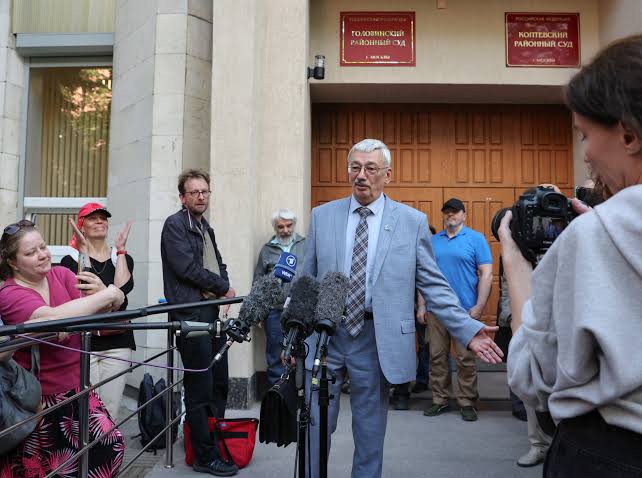Veteran rights activist appeals conviction in Russian court amidst crackdown on dissent

In a Russian court session on Thursday, Oleg Orlov, a distinguished human rights advocate and co-chair of the Nobel Prize-winning group Memorial, launched an appeal against his conviction for discrediting Russian forces.
Orlov, aged 70, was initially fined 150,000 rubles ($1,670) in October, a relatively lenient punishment in contrast to the lengthy jail terms imposed on other critics of Russia’s involvement in Ukraine.
Since President Vladimir Putin deployed Russian forces to Ukraine nearly two years ago, Moscow has taken a harsh stance against prominent rights defenders, compelling many into exile or imprisonment and shuttering leading advocacy groups. Orlov, however, steadfastly denies his guilt and challenges the ruling.
The prosecution, initially content with the fine, later urged the court to impose a three-year jail sentence on Orlov. Accusing him of harboring “political and ideological hatred” towards Russia, prosecutors cited charges related to organizing one-man protests and publishing an opinion piece in French media. In the article, Orlov accused Russian troops of “mass murder” in Ukraine, asserting that his country had regressed into totalitarianism.
Orlov’s defense emphasized his extensive knowledge of Soviet-era repression gained as co-chair of Memorial, an NGO dedicated to preserving the collective memory of the Soviet Union. Established in the late 1980s, Memorial evolved into a cornerstone of Russian civil society, receiving the Nobel Peace Prize in 2022.
Oleg Orlov, whose activism traces back to addressing rights abuses in Russia’s conflicts, particularly the two Chechen wars in the 1990s, has been a vocal opponent of Putin since serving on Russia’s presidential human rights council in the mid-2000s. Despite the risks and challenges, he continued his advocacy even after Russia launched a full-scale assault on Ukraine in February 2022.
Orlov, accompanied by Dmitry Muratov, founder and editor-in-chief of Novaya Gazeta and a 2021 Nobel Peace Prize laureate, faces charges rooted in new legislation that the Kremlin employs to prosecute critics of its Ukraine campaign.
This crackdown has led to the detention, imprisonment, or fines for thousands of Russians who oppose the conflict. The case not only spotlights Orlov’s plight but also underscores broader concerns about the state of dissent and human rights in contemporary Russia.












